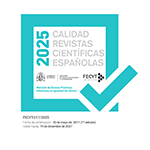Los llamados puentes alimentarios: solidaridad, lucha contra el despilfarro y derechos humanos
Resumen
La convivencia entre altas tasas de despilfarro alimentario y una creciente bolsa de personas en situación de pobreza alimentaria es una de las paradojas del sistema alimentario contemporáneo. Los puentes alimentarios son estrategias que, impulsadas por distintos actores, persiguen que alimentos aptos para el consumo que han quedado fuera del circuito comercial puedan ser reconducidos hacia personas que están en situación o riesgo de exclusión social. En algunos casos, dichas estrategias no han surgido tanto desde un deseo de atender a personas que están en situación o riesgo de inseguridad alimentaria, sino más bien desde la necesidad de dar salida a importantes cantidades de excedentes alimentarios e, incluso, con el objetivo de acceder a los beneficios fiscales y sociales que se asocian a las donaciones de alimentos. Quedan así relegadas a un segundo plano cuestiones como el impacto que este tipo de prácticas tienen en las personas receptoras de los alimentos y la compatibilidad de algunos modelos de donación con fórmulas de intervención social que están orientadas al desarrollo de la autonomía de las personas. Tras un análisis de estrategias de captación y donación de alimentos sobrantes que están en activo en distintas zonas de España, el presente trabajo analiza, desde un enfoque de derechos humanos, las luces y sombras de este tipo de estrategias a corto, medio y largo plazo
Descargas
Descarga artículo
Licencia
La Revista de Antropología Social, para fomentar el intercambio global del conocimiento, facilita el acceso sin restricciones a sus contenidos desde el momento de su publicación en la presente edición electrónica, y por eso es una revista de acceso abierto. Los originales publicados en esta revista son propiedad de la Universidad Complutense de Madrid y es obligatorio citar su procedencia en cualquier reproducción total o parcial. Todos los contenidos se distribuyen bajo una licencia de uso y distribución Creative Commons Reconocimiento 4.0 (CC BY 4.0). Esta circunstancia ha de hacerse constar expresamente de esta forma cuando sea necesario. Puede consultar la versión informativa y el texto legal de la licencia.












